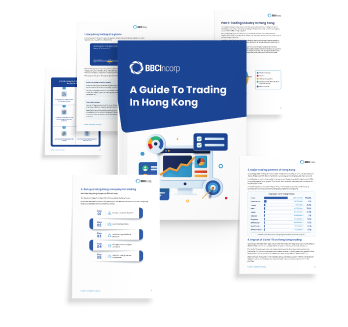
Some people are born traders. Other people become traders. But either way, it’s an art that can be learned and honed to perfection with the right training and guidance.
Coming to the point, Hong Kong is one of the leading global centers for trading goods and services. The territory’s port is among the busiest in the world, and its proximity to the Pearl River Delta has made it a key hub for trade with southern China and the rest of the world.
The city’s economy is dominated by services sectors, which account for more than 90% of GDP. Hong Kong’s traditional manufacturing base has been in decline in recent years, as the territory has shifted towards a more knowledge-based economy.
Overview of Hong Kong trading
The current situation for trading businesses in Hong Kong is a mixed bag. The strong economy and low taxes are still attractive to businesses, but the recent unrest has made things more difficult.
The current situation for trading businesses
According to Research HKTDC, Hong Kong’s economy expanded by 6.4% (advance estimates) year-on-year in real terms in 2021, after a decrease of 6.5% (year-on-year) in 2020.
It showed significant improvement because the figures from the Hong Kong Trade Development Council reported that total exports fell by 2.9% while imports dropped by 5.5% in 2018. The main culprits were drops in exports of electronics and telecommunications equipment, as well as jewelry and precious metals.
Despite these challenges, Hong Kong remains a key location for doing business in Asia. The proximity to China and other major markets makes it a natural gateway for companies looking to expand into the region. In addition, Hong Kong’s business-friendly environment and well-developed infrastructure make it an attractive place to settle.
Establish your Hong Kong
trading operations with
confidence

Major trading partners of Hong Kong in trading
Hong Kong’s thriving economy is a result of its strong trading partnerships with other countries. One such partnership is with The Greater Bay, a collection of nine cities in southern China that together have a population of over 70 million people. The Greater Bay is an important market for Hong Kong’s exports, and the two regions have been working together to strengthen trade ties.
One recent example of this cooperation is the establishment of a “virtual” customs zone between Hong Kong and The Greater Bay. This zone will allow businesses in the region to save time and money when importing and exporting goods. The two sides are also working together to develop a common tariff regime, which will make it easier for businesses to trade goods between the two regions.
Hong Kong’s major trading partners include the United States, China, Japan, and Australia. These countries are all important markets for Hong Kong’s exports, and trade between them is brisk.
The United States is Hong Kong’s largest export market, accounting for more than 20% of its total exports. The two economies are closely integrated, with a large number of American companies doing business in Hong Kong.
China is Hong Kong’s second-largest export market and its largest source of imports. Hong Kong is a key gateway for Chinese companies looking to do business in other parts of the world.
Opportunities and benefits for small-to-medium trading businesses in Hong Kong
Small-to-medium-sized trading businesses in Hong Kong can benefit from a number of opportunities and benefits.
- Close proximity to China
One key opportunity is the city’s proximity to China and its status as a global financial center. This allows businesses to easily access the Chinese market and tap into the growing consumer demand there. Additionally, Hong Kong’s strong legal system and well-developed infrastructure provide a stable and efficient business environment, which can be helpful for foreign investors.
- Low tax rate
Another benefit of doing business in Hong Kong is its low tax rate. In addition to corporate income tax, there is no value-added tax (VAT) or sales tax, making it a cost-effective place to do business. The city also has a well-educated workforce that is especially fluent in English, which can be useful for communication with other countries.
- Economic freedom
Hong Kong’s high degree of economic freedom also provides opportunities. For example, the city has a competitive real estate market and low barriers to the establishment, ownership, and operation of businesses. This means that foreign investors have more options to choose from when looking for a location for their business.
- Culturally diverse
Hong Kong is also very culturally diverse with many foreigners living there, so it may be easier to find employees who are fluent in English and other languages. There are about 200,000 foreign-born workers in Hong Kong who speak dozens of different languages, which can be helpful when communicating with clients or partners whose native language is not English.
Is trading a hotbed for start-ups?
Hong Kong is a hotbed for innovation and start-ups. The region was recently listed as the third most innovative location in South East Asia, behind only Singapore and India but ahead of China which previously held this spot (Global Innovation Index).
According to Invest HK’s own survey conducted last year among 500 entrepreneurs on what makes them choose HK over other places or countries; 90% responded that they liked how quickly things got done here while 83 percent said it has good opportunities especially if one wants access into new markets without much competition yet.
The Hong Kong start-up ecosystem is world-class, with many international founders and investors flocking to this region as they seek the perfect environment for their new businesses.
The group of multi-cultural entrepreneurs continues its work in creating job opportunities that support both local economies as well wider global ones by providing services such as these spaces where people from all walks can come together without judgment or borders; it’s just pure creativity achievable through collaboration!
The Hong Kong government has made it easy to do business in this international hub for entrepreneurship and innovation.
With an efficient legal system, low taxation rates (especially compared with other countries), and ease of access from across Asia or even Europe; there are many factors that make up the one-of-a-kind economic climate here on planet Earth.
And don’t forget about all these passionate young people driven by purpose. They’re going to develop some great things while also making their own marks within society through corporate social responsibility projects like recycling programs – talk about a winning team effort!
Impact of Covid-19 on Hong Kong trading
In times of crisis during trading, it’s important for people to focus on the essentials. In Hong Kong, that means trading essential products like face masks, food, and communication tools. The demand for these products is high and brings more profit to the market.
It’s essential that people in Hong Kong stay safe and healthy during this time of crisis. Trading essential products will help to ensure that everyone has what they need to get through this difficult time.
Coronavirus impact left Hong Kong with a trade deficit of HK$342.2 billion last year as exports dropped 1.5 percent and imports by 3.3 percent, recent figures show.
The economic crisis caused by COVID-19 ended up costing companies quite extensively not only financially but also professionally since many employees lost their jobs due to the crisis.
The coronavirus pandemic that hit Hong Kong hard in 2020 had a devastating effect on the city’s trade and logistics sector, driving exports down 1.5% year on year to HK$3 trillion; however, industry groups are optimistic about their rebound as they leverage growing domestic consumption within mainland China.
The future growth of trading in Hong Kong
The case can be made that this growth-boosting investment will provide multiple benefits, such as more jobs and higher wages, but it may also raise questions about autonomy if we don’t learn from past mistakes or make accommodations without expecting them from our partners in Beijing—a concern swelling recently following announcements concerning national security legislation which threatens independence for one country’s judicial system while giving rise elsewhere across Asia (and beyond).
With the vision to be at the forefront of sustainable finance, Hong Kong’s stock market is seeking ways for increased awareness and accessibility. Grace Hui with Green & Sustainable Finance heading up an ambitious project said that through its STAGE initiative in December 2020 which stands for “The Stage We’re Airing Out Our Dreams”.
It tells us what they want: supporting growth by increasing data availability as well as transparency around green investment products among other things like carbon trading or phasing out unsustainable materials from production altogether – it all starts here!
Conclusion
Hong Kong is the best place for new traders to start because it has a low tax rate, an efficient legal system, and a strong currency. The impacts of COVID19 on its economy are mitigated with the efforts of its government, and its sustainable growth measures are proving to be very effective for all kinds of businesses, most notable for solo entrepreneurs.
Furthermore, The Hong Kong dollar is also pegged to the US dollar, so it’s easy to trade between the two currencies. This means that you can make your first trades right away and focus on building up expertise, and expanding your business as you have never imagined before.
Disclaimer: While BBCIncorp strives to make the information on this website as timely and accurate as possible, the information itself is for reference purposes only. You should not substitute the information provided in this article for competent legal advice. Feel free to contact BBCIncorp’s customer services for advice on your specific cases.
Get helpful tips and info from our newsletter!
Stay in the know and be empowered with our strategic how-tos, resources, and guidelines.


